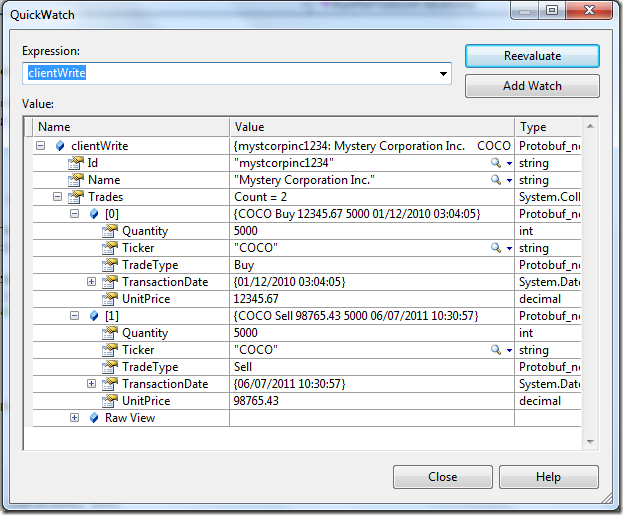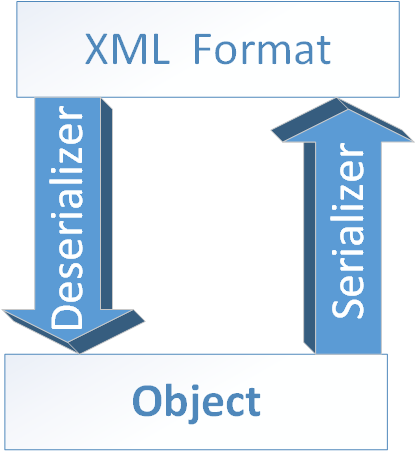Mar 30, 2017 This article is based on the JSON serialization sample. To define the data contract for a Person type. Define the data contract for Person by attaching the DataContractAttribute to the class and DataMemberAttribute attribute to the members you want to serialize. For more information about data contracts, see Designing service contracts. Apply the DataMemberAttribute attribute in conjunction with the DataContractAttribute to identify members of a type that are part of a data contract. One of the serializers that can serialize data contracts is the DataContractSerializer. The data contract model is an 'opt-in' model.
-->Definition
Specifies that the type defines or implements a data contract and is serializable by a serializer, such as the DataContractSerializer. To make their type serializable, type authors must define a data contract for their type.
- Attributes
Examples
The following example serializes and deserializes a class named Person to which the DataContractAttribute has been applied. Note that the Namespace and Name properties have been set to values that override the default settings.
Remarks
Apply the DataContractAttribute attribute to types (classes, structures, or enumerations) that are used in serialization and deserialization operations by the DataContractSerializer. If you send or receive messages by using the Windows Communication Foundation (WCF) infrastructure, you should also apply the DataContractAttribute to any classes that hold and manipulate data sent in messages. For more information about data contracts, see Using Data Contracts.
You must also apply the DataMemberAttribute to any field, property, or event that holds values you want to serialize. By applying the DataContractAttribute, you explicitly enable the DataContractSerializer to serialize and deserialize the data.
Caution
You can apply the DataMemberAttribute to private fields. Be aware that the data returned by the field (even if it is private) is serialized and deserialized, and thus can be viewed or intercepted by a malicious user or process.
For more information about data contracts, see the topics listed in Using Data Contracts.
Data Contracts
A data contract is an abstract description of a set of fields with a name and data type for each field. The data contract exists outside of any single implementation to allow services on different platforms to interoperate. As long as the data passed between the services conforms to the same contract, all the services can process the data. This processing is also known as a loosely coupled system. A data contract is also similar to an interface in that the contract specifies how data must be delivered so that it can be processed by an application. For example, the data contract may call for a data type named 'Person' that has two text fields, named 'FirstName' and 'LastName'. To create a data contract, apply the DataContractAttribute to the class and apply the DataMemberAttribute to any fields or properties that must be serialized. When serialized, the data conforms to the data contract that is implicitly built into the type.
Note
A data contract differs significantly from an actual interface in its inheritance behavior. Interfaces are inherited by any derived types. When you apply the DataContractAttribute to a base class, the derived types do not inherit the attribute or the behavior. However, if a derived type has a data contract, the data members of the base class are serialized. However, you must apply the DataMemberAttribute to new members in a derived class to make them serializable.
XML Schema Documents and the SvcUtil Tool
If you are exchanging data with other services, you must describe the data contract. For the current version of the DataContractSerializer, an XML schema can be used to define data contracts. (Other forms of metadata/description could be used for the same purpose.) To create an XML schema from your application, use the ServiceModel Metadata Utility Tool (Svcutil.exe) with the /dconly command line option. When the input to the tool is an assembly, by default, the tool generates a set of XML schemas that define all the data contract types found in that assembly. Conversely, you can also use the Svcutil.exe tool to create Visual Basic or C# class definitions that conform to the requirements of XML schemas that use constructs that can be expressed by data contracts. In this case, the /dconly command line option is not required.
If the input to the Svcutil.exe tool is an XML schema, by default, the tool creates a set of classes. If you examine those classes, you find that the DataContractAttribute has been applied. You can use those classes to create a new application to process data that must be exchanged with other services.
You can also run the tool against an endpoint that returns a Web Services Description Language (WSDL) document to automatically generate the code and configuration to create an Windows Communication Foundation (WCF) client. The generated code includes types that are marked with the DataContractAttribute.
Reusing Existing Types
A data contract has two basic requirements: a stable name and a list of members. The stable name consists of the namespace uniform resource identifier (URI) and the local name of the contract. By default, when you apply the DataContractAttribute to a class, it uses the class name as the local name and the class's namespace (prefixed with 'http://schemas.datacontract.org/2004/07/') as the namespace URI. You can override the defaults by setting the Name and Namespace properties. You can also change the namespace by applying the ContractNamespaceAttribute to the namespace. Use this capability when you have an existing type that processes data exactly as you require but has a different namespace and class name from the data contract. By overriding the default values, you can reuse your existing type and have the serialized data conform to the data contract.
Note
In any code, you can use the word DataContract instead of the longer DataContractAttribute.
Versioning
A data contract can also accommodate later versions of itself. That is, when a later version of the contract includes extra data, that data is stored and returned to a sender untouched. To do this, implement the IExtensibleDataObject interface.
For more information about versioning, see Data Contract Versioning.
Constructors
| DataContractAttribute()DataContractAttribute()DataContractAttribute()DataContractAttribute() | Initializes a new instance of the DataContractAttribute class. |

Properties
| IsNameSetExplicitlyIsNameSetExplicitlyIsNameSetExplicitlyIsNameSetExplicitly | Gets whether Name has been explicitly set. |
| IsNamespaceSetExplicitlyIsNamespaceSetExplicitlyIsNamespaceSetExplicitlyIsNamespaceSetExplicitly | Gets whether Namespace has been explicitly set. |
| IsReferenceIsReferenceIsReferenceIsReference | Gets or sets a value that indicates whether to preserve object reference data. |
| IsReferenceSetExplicitlyIsReferenceSetExplicitlyIsReferenceSetExplicitlyIsReferenceSetExplicitly | Gets whether IsReference has been explicitly set. |
| NameNameNameName | Gets or sets the name of the data contract for the type. |
| NamespaceNamespaceNamespaceNamespace | Gets or sets the namespace for the data contract for the type. |
| TypeIdTypeIdTypeIdTypeId | When implemented in a derived class, gets a unique identifier for this Attribute. (Inherited from Attribute) |
Methods
| Equals(Object)Equals(Object)Equals(Object)Equals(Object) | Returns a value that indicates whether this instance is equal to a specified object. (Inherited from Attribute) |
| GetHashCode()GetHashCode()GetHashCode()GetHashCode() | Returns the hash code for this instance. (Inherited from Attribute) |
| GetType()GetType()GetType()GetType() | Gets the Type of the current instance. (Inherited from Object) |
| IsDefaultAttribute()IsDefaultAttribute()IsDefaultAttribute()IsDefaultAttribute() | When overridden in a derived class, indicates whether the value of this instance is the default value for the derived class. (Inherited from Attribute) |
| Match(Object)Match(Object)Match(Object)Match(Object) | When overridden in a derived class, returns a value that indicates whether this instance equals a specified object. (Inherited from Attribute) |
| MemberwiseClone()MemberwiseClone()MemberwiseClone()MemberwiseClone() | Creates a shallow copy of the current Object. (Inherited from Object) |
| ToString()ToString()ToString()ToString() | Returns a string that represents the current object. (Inherited from Object) |
Explicit Interface Implementations
| _Attribute.GetIDsOfNames(Guid, IntPtr, UInt32, UInt32, IntPtr)_Attribute.GetIDsOfNames(Guid, IntPtr, UInt32, UInt32, IntPtr)_Attribute.GetIDsOfNames(Guid, IntPtr, UInt32, UInt32, IntPtr)_Attribute.GetIDsOfNames(Guid, IntPtr, UInt32, UInt32, IntPtr) | Maps a set of names to a corresponding set of dispatch identifiers. (Inherited from Attribute) |
| _Attribute.GetTypeInfo(UInt32, UInt32, IntPtr)_Attribute.GetTypeInfo(UInt32, UInt32, IntPtr)_Attribute.GetTypeInfo(UInt32, UInt32, IntPtr)_Attribute.GetTypeInfo(UInt32, UInt32, IntPtr) | Retrieves the type information for an object, which can be used to get the type information for an interface. (Inherited from Attribute) |
| _Attribute.GetTypeInfoCount(UInt32)_Attribute.GetTypeInfoCount(UInt32)_Attribute.GetTypeInfoCount(UInt32)_Attribute.GetTypeInfoCount(UInt32) | Retrieves the number of type information interfaces that an object provides (either 0 or 1). (Inherited from Attribute) |
| _Attribute.Invoke(UInt32, Guid, UInt32, Int16, IntPtr, IntPtr, IntPtr, IntPtr)_Attribute.Invoke(UInt32, Guid, UInt32, Int16, IntPtr, IntPtr, IntPtr, IntPtr)_Attribute.Invoke(UInt32, Guid, UInt32, Int16, IntPtr, IntPtr, IntPtr, IntPtr)_Attribute.Invoke(UInt32, Guid, UInt32, Int16, IntPtr, IntPtr, IntPtr, IntPtr) | Provides access to properties and methods exposed by an object. (Inherited from Attribute) |
Applies to
See also
I'm new to WCF and unfortunately only know VB.NET. Having read this post - DataContract XML serialization and XML attributes which is most interesting I have attempted to directly convert it to VB.NET, but it does not seem to give me the right results. All I get is the root element with no attributes:
Any clues on how to add attributes to an element using VB.NET will be greatly appreciated.
OK Here's the code:
And the Data Contract is:
The output is:
Which as you can see does not have success and timestamp as attributes.
2 Answers
You didn't post your code, but you may have used the wrong syntax - C# uses square brackets ([, ]), VB.NET uses angle brackets (<, >):
Example (based on the C# code in the linked answer, changed to VB.NET by hand so there may be some minor syntactic typos):
You'll also need to add a reference to System.Runtime.Serialiation and System.Xml.Serialization:
UPDATETo follow up to my suggestion in my comment under your question, what if you did something like this:
The expected output should be something like this (I haven't tested this):
Datacontractserializer Attributes Xml
TimTimI was working on the same thing a few weeks back here is a sample of the code I got to work, hope it helps (i've included the xml I used to test this):
StandageC# Datacontract Attribute
StandageData Contract Serializer Attributes Examples




